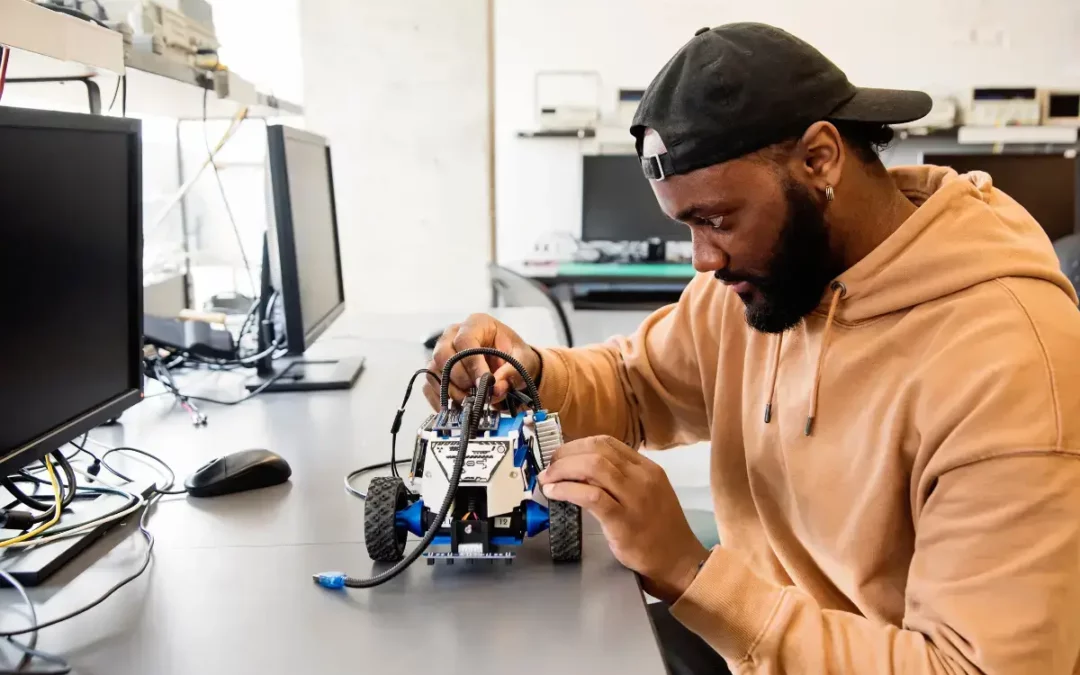You could have a future in autonomous systems, also known as robotics! Keep reading to learn more about autonomous systems, where they are used, and why they’re necessary. Plus, we’re expanding on what’s exciting about autonomous systems and robotics careers.
The What: What are autonomous systems?
Autonomous systems perform tasks with little to no human help, guidance, or intervention for an extended period. An important key feature of autonomous systems (also known as robotics or mechatronics) is their ability to interact with humans and they frequently enhance our work.
For a device, software, or piece of technology to be autonomous, it must be able to complete specific tasks in an environment that may shift and change around it. This requires sensing the environment, understanding its place within it, analyzing incoming data from different sources, and reacting appropriately.
The Where: Where are robots and autonomous systems used in our world?
Autonomous vehicles (think: driverless cars) and factory/warehouse robots are commonly used autonomous or semi-autonomous systems. Robotic surgery systems, robot vacuums, unmanned aerial vehicles, and drones are also examples of autonomous systems you may have heard of. These are a few of the fields that have incorporated autonomous systems into their work in a very crucial way, and the list is growing!
The Why: Why are autonomous systems necessary?
Robotics can play an important role in our lives. Autonomy is a necessary technology that has and will continue to revolutionize many areas of our society.
Think of the increasing prevalence of self-driving cars on our streets. These vehicles are becoming important to industries and populations across the country. Autonomous technology can be used to keep people safe and increase productivity by optimizing commercial transportation, enhancing search-and-rescue operations, allowing for safe exploration of deep seas and space, and creating more effective prosthetics and mobility aids.
We can also use autonomous robots to transform agricultural practices, perform safe surgeries, and analyze images. These autonomous systems can perform tasks with replicable precision and even access areas and complete tasks that are dangerous for humans.
The Work: Planning your autonomous systems and robotics career.
These systems can transform so many different areas of our lives, and autonomous systems and robotics careers allow you to build familiarity and expertise across disciplines. Mechanical and space engineering, electrical and computer engineering ,and computer science are just a few of the crucial areas that may influence your work in robotics. If you are interested in these fields, working in autonomous systems may be for you!
Here are some actual jobs in robotics; your career might be among them!
- Robotics and Autonomous Systems Engineer: Design, fabricate, test, and assemble robots
- Electromechanical and Robotics Technician: Test, operate, and repair robots and other automated machines
- Mechanical Engineer: Develop new robots for different uses
- Design Engineer: Focus on the visual appearance of robots
- Software Engineer: Ensure optimal functionality by designing the software that makes robots run and move
- Hardware Engineer: Develop the necessary physical components that run the systems
So far, we’ve outlined how autonomous systems work independently of human control and intervention, at least for certain periods of time. This doesn’t mean there is not a place for engineers, drivers, machinists, designers, observers, and more within these systems and the larger ecosystems they operate within. Some of the systems we’ve described so far are only semi-autonomous and need human operation in some capacity.
The role we as humans will play in autonomous systems will continue to shift, but for now, many roles are crucial to the success of this growing field. You could be a part of creating useful and safe interactions between the public and autonomous systems of all kinds.
We hope this blog post has piqued your interest in learning more about working in robotics and the potential of a career in autonomous systems! There is so much more to explore and innovate in these areas, and you could be the one to do it. Happy automating!

